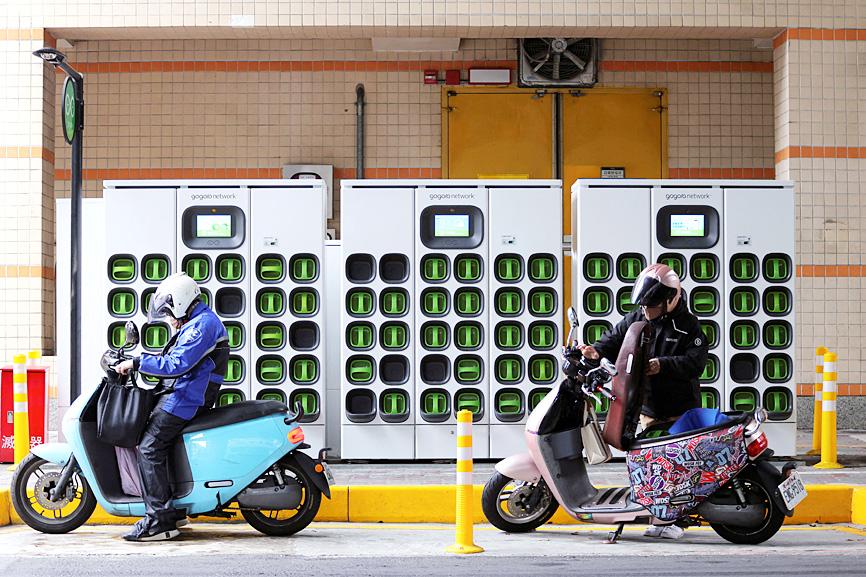Electric scooter maker Gogoro Inc (睿能創意) has all the chips it needs for now, but could face a squeeze by year-end as it pushes big plans to grow in China, India and Southeast Asia, founder and chief executive Horace Luke (陸學森) said yesterday.
While a global shortage of semiconductors has slammed auto makers, Luke said in an interview that Gogoro, which listed in New York this month, uses far fewer chips than electric automakers and still has a relatively small market concentrated in Taiwan.
For the next several months it has a “healthy supply” of chips, he said.

Photo: Annabelle Chih, Reuters
“A combination of we don’t use as many, a combination of being flexible on our design, a combination of having a market that is not yet gigantic at the moment,” Luke said, explaining Gogoro’s chips situation.
Founded in 2011, Gogoro listed on the NASDAQ via a merger with blank-check firm Poema Global Holdings Corp and has a market value of about US$2.4 billion.
The firm has ambitious plans for China, India and Southeast Asia, seeing potential in replacing vast fleets of heavily polluting, gasoline-powered scooters with electric two-wheelers as Asia’s metropolises bid to improve air quality.
“As those cities like Jakarta, or Delhi, or other big markets grow, how fast they grow of course will then put stress on our supply chain management, but those are problems that are coming in the later part of the year, not the immediate future,” Luke said.
As well as making its own vehicles, Gogoro has electric battery and other partnerships with vehicle makers, including India’s Hero MotoCorp Ltd, and China’s Dachangjiang Group Co (大江集團) and Yadea Group Holdings Ltd (雅迪集團控股).
Gogoro, known for its green-hued battery swap distribution network for riders, generates about 90 percent of its revenue from Taiwan.
Electric vehicle makers have been hit by price hikes for raw materials such as nickel, driven by supply chain disruptions from the war in Ukraine, and Luke said some “minor” price rises had been passed onto customers.
Gogoro’s stock has dropped about 19 percent since listing, matching pressure on other tech plays globally.
However, Luke said Gogoro was confident in expansion plans in countries like China, India and Indonesia, which have a high consumer preference for scooters, with millions sold each year.
“That’s what our investors, our team, is focused on, and that’s what our partnerships are focused on, to take our technology which we’ve created and go into those large markets that have high potential to convert to electric,” he said.

SELL-OFF: Investors expect tariff-driven volatility as the local boarse reopens today, while analysts say government support and solid fundamentals would steady sentiment Local investors are bracing for a sharp market downturn today as the nation’s financial markets resume trading following a two-day closure for national holidays before the weekend, with sentiment rattled by US President Donald Trump’s sweeping tariff announcement. Trump’s unveiling of new “reciprocal tariffs” on Wednesday triggered a sell-off in global markets, with the FTSE Taiwan Index Futures — a benchmark for Taiwanese equities traded in Singapore — tumbling 9.2 percent over the past two sessions. Meanwhile, the American depositary receipts (ADRs) of Taiwan Semiconductor Manufacturing Co (TSMC, 台積電), the most heavily weighted stock on the TAIEX, plunged 13.8 percent in

A wave of stop-loss selling and panic selling hit Taiwan's stock market at its opening today, with the weighted index plunging 2,086 points — a drop of more than 9.7 percent — marking the largest intraday point and percentage loss on record. The index bottomed out at 19,212.02, while futures were locked limit-down, with more than 1,000 stocks hitting their daily drop limit. Three heavyweight stocks — Taiwan Semiconductor Manufacturing Co (TSMC, 台積電), Hon Hai Precision Industry Co (Foxconn, 鴻海精密) and MediaTek (聯發科) — hit their limit-down prices as soon as the market opened, falling to NT$848 (US$25.54), NT$138.5 and NT$1,295 respectively. TSMC's

In a small town in Paraguay, a showdown is brewing between traditional producers of yerba mate, a bitter herbal tea popular across South America, and miners of a shinier treasure: gold. A rush for the precious metal is pitting mate growers and indigenous groups against the expanding operations of small-scale miners who, until recently, were their neighbors, not nemeses. “They [the miners] have destroyed everything... The canals, springs, swamps,” said Vidal Britez, president of the Yerba Mate Producers’ Association of the town of Paso Yobai, about 210km east of capital Asuncion. “You can see the pollution from the dead fish.

TARIFFS: The global ‘panic atmosphere remains strong,’ and foreign investors have continued to sell their holdings since the start of the year, the Ministry of Finance said The government yesterday authorized the activation of its NT$500 billion (US$15.15 billion) National Stabilization Fund (NSF) to prop up the local stock market after two days of sharp falls in reaction to US President Donald Trump’s new import tariffs. The Ministry of Finance said in a statement after the market close that the steering committee of the fund had been given the go-ahead to intervene in the market to bolster Taiwanese shares in a time of crisis. The fund has been authorized to use its assets “to carry out market stabilization tasks as appropriate to maintain the stability of Taiwan’s